There are more diesel-powered cars available now than ever. Unfortunately, almost all of them are expensive cars.
One of the few – one of the two – that’s not is VW’s Jetta TDI.
Its only competition is the Chevy Cruze diesel, which is the only other diesel-powered sedan you can currently buy for less than $25k.
But in the Chevy’s case, just barely.
Its MSRP is $24,985 – and unless you possess epic haggling skills, the out-the-door price (including taxes and tags) is almost certain to be over $25k.
Meanwhile, the Jetta TDI’s base price is just over $21k – so getting one out-the-door for under $25k ought to be doable.
But there’s more to it than just dollars and cents (and MPGs). The Jetta is also appealing for what it has – and hasn’t got.
Like a manual transmission (with an automatic optional) as opposed to the Chevy’s one-choice-fits-all automatic transmission only.
And multiple body styles – sedan and wagon. The Cruze comes just one way (sedan).
Looks like someone brought a knife to a gun fight.
And it’s not VW.
The Jetta is VW’s mid-sized sedan/wagon a bit smaller than the Passat – a bit larger than the compact-sized Golf hatchback sedan.
It’s available with both gas and diesel and hybrid powertrains.
The TDI (turbo direct injection) diesel Jetta sedan’s base price is $21,295 with the six-speed manual transmission. With the optional Direct Shift (DSG) six-speed automatic transmission, the sticker reads $22,395.
A Chevy Cruze diesel – the only other car in this class that’s available with a diesel engine – starts at $24,985.
The Cruze diesel’s highway mileage (46 MPG) is better than the VW’s (42 MPG) but the VW does better in city driving (30 MPG vs. 27 for the Chevy) so the two cars’ “combined” MPG (34 for the VW, 33 for the Chevy) is dead heat.
When the current Jetta came out a couple of years ago, there were complaints about cheap-outs, including drum rear brakes being standard. All 2014 Jettas come standard with four-wheel-disc brakes now, as well as an independent rear suspension.
TDI Jettas come standard with a “soft touch” dashpad, fancier faux leather interior trim, excellent seat heaters and 16 inch wheels.
WHAT’S GOOD
Best value – period.
Standard manual transmission – and no fuel economy penalty for selecting it.
Vastly roomier inside (both rows) than the Cruze.
Quicker than the Cruze diesel (with either transmission) and just as economical to drive.
But costs less to buy.
WHAT’S NOT SO GOOD
Uh…
Well…
Hmmmm…
They’re not giving them away?
You can’t turn the DRLs off?
UNDER THE HOOD
TDI Jettas are propelled by a 2.0 liter, 140 hp turbo-diesel four-cylinder engine paired with either a six-speed manual transmission (standard) or (optionally) a six-speed DSG “automated manual.” The DSG is a more efficient form of automatic that combines design elements (and inherent efficiencies) of a conventional manual transmission but with the put-it-in-drive and forget-about-it convenience of a fully automatic transmission.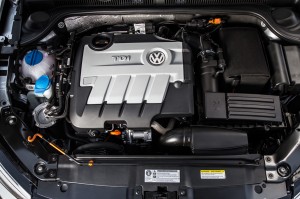
Interestingly, your rated mileage will be identical regardless of transmission choice. The manual six-speed Jetta and DSG automatic-equipped Jetta both deliver the same 30 city, 42 highway. Often, there will be a mileage penalty to pay for choosing a manual over an automatic transmission, but that is not the case here.
Chevy’s Cruze diesel produces slightly more power (148 hp) and torque (258 ft.-lbs. vs. 236 ft.-lbs. for the TDI VW). Its highway mileage (46 MPG) is best-in-class (and better than the Jetta TDI’s 42 MPG on the highway) but this is mitigated (in the Jetta’s favor) by the Chevy’s lower city mileage (27 MPG vs. 30 for the VW) as well as the Jetta TDI’s much lower price tag.
There is also a performance gap.
Both versions of the Jetta TDI (manual and automatic) are quicker than the Cruze, 0-60. The automatic-only Chevy gets there is 8.6 seconds while the DSG Jetta does the same deed in 8.4 seconds.
The manual Jetta is quicker still.
Why the disparity – given the Chevy’s got the stronger engine?
Because it’s the heavier car – 3,471 lbs. at the curb vs. 3,210 for the VW.
Another debit against the Chevy: Its diesel engine requires diesel exhaust fluid in order to pass muster, emissions-wise. This means periodic top-offs of DEF as well as diesel fuel.
The Jetta TDI manages to be smog-legal without the DEF.
This saves you some money – as well as some hassle.
Diesels are known for their excellent mileage. As word gets out about their now-excellent performance, their popularity is certain to increase.
Consider: The Jetta TDI accelerates to 60 several seconds more quickly than a Prius hybrid – which needs 10-11 seconds to get there (vs. 8.2-8.4 for the TDI VW).
But there’s more to it than getting-going.
Another virtue of the diesel-powered car relative to a hybrid car is how at home it feels on the highway. Hybrids are optimized for low-speed (and stop-and-go) driving. On the highway, their powertrains are often working hard to keep up – especially at speeds over 70 MPH. The gas engine is not only on continuously (because at highway speeds, a hybrid’s electric battery drains in minutes, forcing the gas engine to kick on to keep you moving) it is small and underpowered – and it shows.
Lots of engine-revving contretemps. Very little in the way of reserves on tap.
Remember: A hybrid’s gas engine is only half the hybrid’s powertrain (the other half being the electric motor and battery pack) and it’s typically a very small gas engine. Or rather, small for the car. Because it’s only needed part-time and because that’s how hybrids save fuel.
A diesel-powered car like the Jetta TDI, on the other hand, happily hums along at 70-80 MPH with the engine barely working to maintain speed. It has no batteries to deplete. And it will go 600-plus miles (on the highway) before it needs a top-off.
Now, you may have checked the specs and are saying to yourself: Wait a minute. The Prius is rated 48 MPG on the highway. That’s better than both the Jetta TDI and the Chevy Cruze diesel.
Which is true. If you don’t drive 70-plus MPH.
Keep it at 60-ish and the Prius’ mileage may be as advertised. But then, you’ll be the slowest moving thing on the road – a true Road Clover. If you keep up with traffic – which these days means maintaining 70-75 MPH on most highways – I assure you a Prius’ highway mileage will be nowhere near as advertised.
And not as good as the Jetta’s or the Cruze’s.
The other side of the coin here is that the Jetta TDI (and for that matter, the Cruze diesel) drives less clunky than the Prius, which handles awkwardly, does not appreciate sudden steering inputs (as when swerving to avoid a deer) and (per above) is much noisier under duress (as when accelerating).
Relative to the gas-engined Jetta, the TDI Jetta’s other big plus is its down-low grunt. The diesel engine produces much more torque than either of the Jetta’s two available gas-burning engines. In fact, the TDI engine produces almost twice the torque of the base Jetta’s gas-burning engine: 236 ft.-lbs. vs. 125 ft.-lbs.) and makes it much sooner (at 1,750 RPM vs. 4,000 RPM).
Translation: When you push the “gas” pedal, the diesel engine pulls much harder with less pedal pushing. In fact, it will spin the tires if you push it more than half-way down coming off the line. The abundant and easily accessed torque (which is maintained throughout the powerband) also makes part-throttle merging and passing a relaxing experience. You will find that you rarely need to work the engine hard.
But it’s fun to do it sometimes.
Looks are subjective.
The Jetta’s roomier-than-thou (well, roomier-than-Cruze) interior isn’t.
Take a gander: The Jetta has 41.2 inches of legroom up front and – here’s the really big one – 38.1 inches of legroom in the second row. Compare those numbers with the Cruze’s. It has slightly better front-seat legroom (42.3 inches) but its backseat legroom (35.4 inches) is not even in the ballpark. For those who haven’t got a calculator handy, the VW has almost 3 inches more legroom in the second row. That’s the difference between tight – and comfortable.
Same goes for trunk space, by the way. The Chevy’s got 13.3 cubic feet; the VW 15.5 cubic feet.
Inside and out, the Jetta is Teutonically tidy. Alles in ordnung ist.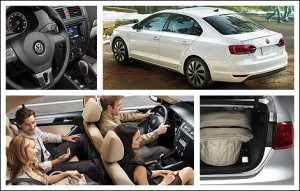
Straightforward layout. Analog gauges facing you; demure piano black and brushed nickel trim plates in not-excessive quantity. Sensible – purposeful – pull-up emergency brake lever. Large, rotary controls for the temperature, fan and air outlet settings. Generous “scoops” built into the lower door panels to accommodate stuff. Superb paint quality – including the door jambs and underside of the trunk and hood.
Thoughtful touches include a separate dome light for the second row occupants, controlled by a high-class-looking rotary knob.
Is there anything not to like?
I found one small thing – literally.
The center console storage area is hilariously tiny. You might fit a pack of cigs in it.
The argument has been put forward that the usually higher cost of the diesel-powered version of a given car (and the always-higher cost of diesel fuel) takes away from the economic case for buying a diesel-powered car over its gas-engined equivalent.
If we’re talking Chevrolet, that is a compelling argument.
Even if you manage to buy one for “sticker,” you’re still looking at about $25k. Which eats away a lot at the putative mileage advantage… relative to the Jetta.
Which you can buy for about $3,700 less.
And which will give you almost exactly the same MPGs, overall.
And the $3,700 ($3,690 to be precise) you saved on the car? At current prices ($3.80 per gallon in my neck of the woods) that’s worth almost 1,000 gallons of fuel. The Jetta TDI’s “combined” (EPA’s terminology for average) fuel economy is 33 MPG.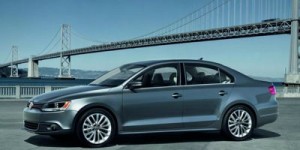
Got your calculator? That’a 33,000 miles – give or take – of free driving.
If you buy the Jetta TDI over the Chevy Cruze diesel.
Parenthetically, the same argument applies with equal force vis-a-vis the Prius hybrid, which has a base of $24,200. And while its mileage on paper might be better, in the real-world, it’s often not. And even if it were, the Prius will eventually have issues with its batteries. Whereas the TDI diesel should deliver Methuselean longevity (300,000-plus miles) before it begins to show signs of getting tired.
Or, from another angle: The money you save on the car can be put toward options. Maybe the eight-speaker Fender premium audio rig, for instance.
Or the sunroof.
What’s not to like?
Very little (perhaps maybe the little center console cubby).
Sure, diesel fuel could be cheaper (it’s not, courtesy of the government) which would make a car such as this even more appealing.
But even given not-cheap diesel fuel, the Jetta TDI rights the math. This is a car thatmakes sense.
But which is also a lot more than merely sensible.
Throw it in the Woods?
PS:
If you value alternatives to the mainstream media, please support independent media.
Our donate button is here.
If you prefer to avoid PayPal, snail mail is fine. The address is:
EPautos
721 Hummingbird Lane SE
Copper Hill, VA 24079







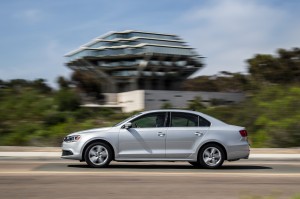
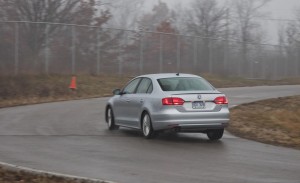
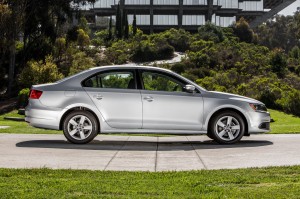








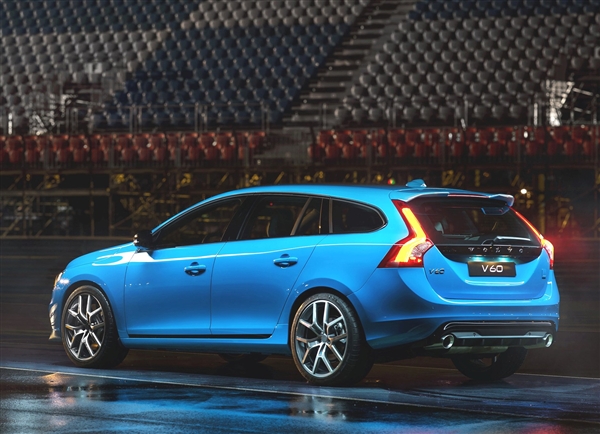
Eric what kind of mileage do you normally get on test cars? Do you usually hit the EPA combined number with a gas car?
Hi Matt,
It varies – often significantly.
To be fair, I will drive a car like the Porsche Cayenne S I had a few months back very differently than I would a Prius (or even the Jetta I just reviewed).
The takeaway is: Your mileage will vary. Everyone drives differently, under different conditions. So the EPA’s numbers are rough approximates and not to be taken as definitive.
Wow, that’s a great price considering they fixed the rear end and brakes. When I was shopping for a sport wagon I noticed the 2010s were going for more then the price of a new one, and were selling as soon as they hit the web sites, mostly because of the suspension changes.
I was wondering what was going to replace the “classic” Audi A3, now that the new A3 starts at $35K and is trying to compete with the BMW 3 series.
I’m a very big fan of this car. It’s truly the only affordable diesel passenger car on the market right now.
I just wish it were more efficient. See today’s rant – just posted….
eric, this is weird. Just got off the phone with a trucker friend. We were speaking of leaving our trucks at a quarry, going back home or to an RV park, then doing the opposite during the day. He mentioned he had an old Jetta diesel, gets 63mpg at 75 mph. Now that’ll work. Oh wait, it couldn’t possibly be true, it has no DEF, no computer and no 30,000 lb. injector pressures(someone wrote that was not correct but it is and anyone who wants to verify it for themselves can with a few minutes and a search engine). My old diesel with injectors 3 times as long, no piezo or computer had the mechanical pump delivering several thousand lbs of fuel pressure. Now 25-30K pressures in direct injection(gasoline) engines and 25-30K pressure in new diesel engines are the pressures being run. Sure, they’re much quieter, a tiny bit more responsive and powerful(gasoline) and cleaner burning but they don’t have the durability or reliability of past diesels. My KW Cat powered truck sprays once every cycle, not 5-6 times, and it is slightly less clean but the overall mileage is much higher. Huh? Like the Caddy CTS that can be ordered with old style injection or direction injection. The engine develops something like 263 HPwith the old style and304 hp with the new style, the mileage is virtually identical. Where is that magical 10 percent? This is not my opinion, it’s Caddillac’s figures. I get this from Cadillac and it’s there for everyone to peruse.
And all those PACCAR, Cummins, Cat and Detroit Diesel powered new trucks sitting on the side of the road, for the most part, aren’t victims of better injection(sic)but all those computers and piezo controlled injectors and(don’t tell anyone)plain ass old vibration and voltage surges those computers can’t handle. And let’s don’t speak of old mechanical pumps that run forever on non-low sulfur fuel with no DEF. Those unreliable engines that go forever and need no battery if you lose them and can be towed or pushed to start. It’s nice to know you can get another truck in front of you to use his headlights when yours are dead and your truck will run just fine.
A few quick bits of additional information.
1. No, it’s not available in all-wheel-drive configuration. It’s front-wheel-drive only. Thus it’s not as good as AWD in icy conditions but isn’t as bad as rear-wheel-drives.
2. The wagon configuration starts at roughly $5k more than the sedan and doesn’t have the lower end trim levels. That’s a shame as it puts it over $26k to start and it would make one heck of a good alternative to a small crossover SUV (still does, even at that price).
3. The wagon gets the same mpg as the sedan.
4. In most cases, though not all, you will actually get superior mileage than what EPA estimates predict with a diesel because EPA doesn’t have as accurate a testing model for diesels. Thus while the Jetta TDI is rated 30/42, it’s realistic to expect 5+ mpg better, especially once the engine is broken in (say 10k miles or so).
5. Reliability for the 2013 model appears to be excellent overall. Combine that with the longevity of the TDI engine, and this is one model that you can purchase and realistically expect to drive for 200k miles with proper maintenance.
6. Diesel fuel costs fluctuate through the year much more than gasoline, and it fluctuates much more depending on what region in the country you are as well. It’s cheapest in the summer months, often dipping below the cost of regular gasoline in my area (Arkansas) and typically averaging around mid-grade to premium-grade gasoline prices. Winter blends of diesel tend to be more expensive vs. gasoline. Also, I have noticed that California’s gasoline is especially expensive relative to diesel.
7. Do the math. The efficiency improvement vs. gasoline is a relative thing. A 10mpg improvement over a gas engine is huge if you’re talking about going from 20mpg to 30mpg (50% improvement) but not as big going from 30mpg to 40mpg (only a 33% improvement). The starting price of the gas model is around $5k less than the diesel Jetta.
8. Check on service costs. VW provides free routine maintenance on their cars for 3 years or 30,000 miles. After that, you foot the bill. German cars are notorious for expensive service costs, so check with the dealership about what a 40k mile service might cost you, and also check around for a private shop that would do it for much less. If you’re keeping a car for 200k miles, you’re looking at quite a lot of service and maintenance visits and that could eat into the savings.
9. Do not assume you can use biodiesel. Just because this model passes emissions requirements without needing DEF (diesel exhaust fluid) doesn’t mean it doesn’t have a DPF (diesel particulate filter). These filters are regenerated by burning off the soot every so often when the emissions systems spray a little diesel into the exhaust ahead of the DPF which is hot enough to ignite the diesel. Unfortunately, biodiesel requires a higher temperature to combust than regular (so-called “dino-diesel”) diesel fuel. Thus it actually can gum up the DPF and cause worse problems as well as an expensive repair. Most VWs are restricted to no greater than 5% biodiesel mixed with regular diesel, called B5. Any damage done due to running higher concentrations will not be covered under warranty. There are quite a few fuel stations in Illinois that only have biodiesel mixes at the pump. They can be as much as $2/gallon cheaper (thanks to your fellow taxpayer subsidizing your fuel), but the ones I saw were rated 5-20% biodiesel, thus not safe in modern diesel engines.
10. Don’t worry about the old-school diesel problems in cold weather. Modern “glow plugs” that heat the diesel so it will flow better through the fuel lines warm the fuel up within a second or two, so there is only the slightest noticeable delay between hitting the ignition and the engine firing up. It’s actually amazing. Don’t fear a diesel in cold climates unless you’re north of the Arctic Circle.
All that said, I’d much rather have this than, say, any Prius simply because they will have better driving characteristics both in town and on the highway and will be more fun. They will also last longer, generally speaking, be nicer inside and out, be more comfortable, and faster/better handling.
Thanks for the detailed post, SJ!
On the mileage: I averaged 42 MPG during most of my weeklong test drive, according to the car’s computer. I buy this. Because – typically – I will not get a full weeks’ worth of driving in a car without having to add fuel (gas) before the end of the week. They are picking up the Jetta today – and it still has more than a quarter-tank left.
Amazing.
I just bought a ’14 Jetta Wagon, but not the diesel. The base wagon is a 2.5L five cylinder gas engine. I got it with the 5-spd, and really no other options. Price was $19,200. I worked the math on the diesel and it didn’t really work. My car gets 33mpg on the highway and averages about 30 combined. The 5cyl has a timing chain & regular fuel injection (not GDI). At 70mph it turns about 2000 rpms. Has good pickup in 1st and 2nd gear, but not really any passing power once at speed. I’ve had my car for 3 months now and am very happy with it.
Hi Tom,
Someone here mentioned that the Jetta wagon TDI’s MSRP is considerably higher than the TDI sedan’s. That’s unfortunate. The TDI sedan, of course, stickers for just over $21k – so only about $1,000 more than you paid for your wagon.
The mileage difference between the two is big enough that you’d make that $1k back pretty quickly. (I averaged 42 point something during the week I had the car.) If the price difference is $4k or so – as it would be for the TDI wagon – then of course, it would take longer to reach break-even (and you might never reach it, depending on how long you keep the car).
Either way – TDI or gas-engined – the Jetta’s a great car. I think you’ll be very happy with it!
Do you really think the ultra-high pressure injectors will last 300,000 miles?
After all, you were worried about them in your GDI article and a commenter there pointed out that gasoline direct injectors operate at 1/10th the pressure of turbo-diesel injectors.
I have enjoyed driving the 2001 VW Golf TDI which shared the same engine with the Jetta & New Beetle.
I am sure this VW will be fun to drive as well. I like the no nonsense plain layout of the controls.
One potential issue for the TDI is if it has an interference design for its engine. If it does then you must follow the timing belt changes on schedule. Also recommend changing any other parts that are driven by the timing belt.
The water pump did my Golf in prematurely @ ~135k miles even though I changed the timing belt when needed.
The change is not inexpensive (especially if done @ the dealer) — easily can cost over $1000.
While I’m not fam with the Jetta, I am with the TDI Passat. It has the same diesel front wheel spin as the Jetta. In fact, coming from a real wheel pusher to a front wheel puller, I’ve spun the wheels more often that I car to recall–with the associated tire tread loss. The TDI Passat is rated @ 40 MPG on the highway. I get 35 in mixed driving, and can go over 500 miles on a tank. And diesel is now cheaper than supreme gas now. If it only wasn’t an automatic. 🙁
Another strike against the Chevy: If you just pour water ( or even urine ) in the DEF tank, the sensors will detect that the concentration of Urea is under 35%, and refuse to start the engine.
You WILL help Chevy obey insane federal regs, or the car will not start.
I am curious about what the resistance value of a working sensor is when it sees a proper concentration. I suspect it can be replaced with a $1 Radio Shack resistor.
It was my understanding every brand is this way. Big 3 pickups certainly are, no free rides in any of them. If you could bypass that, I suspect a great many people would. It would be as common as inverting the air cleaner lid and gaining 40 hp used to be on GM V-8’s, stick on some tube headers with duals, remove the smog pump and those engines would really come alive. After all, any ICE is simply an air pump.
Question: Is the 4Motion AWD system available? If so, I’d buy the wagon for to get cargo carrying and snow day capabilities without the porcine road feel and fuel consumption of an SMoooo-Vee.
Another question: Why aren’t station wagons more common/popular? A station wagon makes far more sense for many people than an SUV; for example, if you want some extra cargo space once in a while.
Not yet. I read a rumor of a TDI Jetta 4-motion for next year.